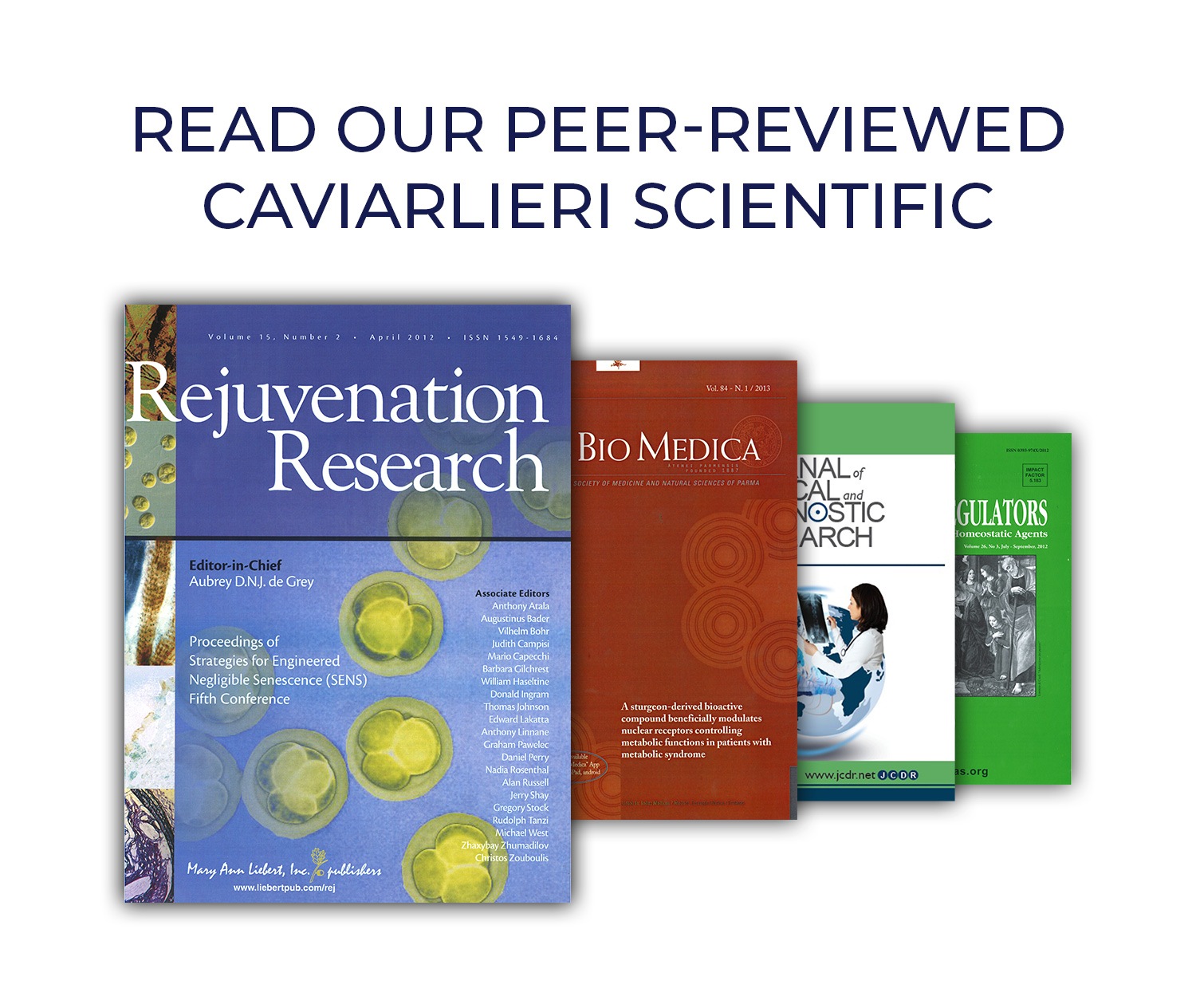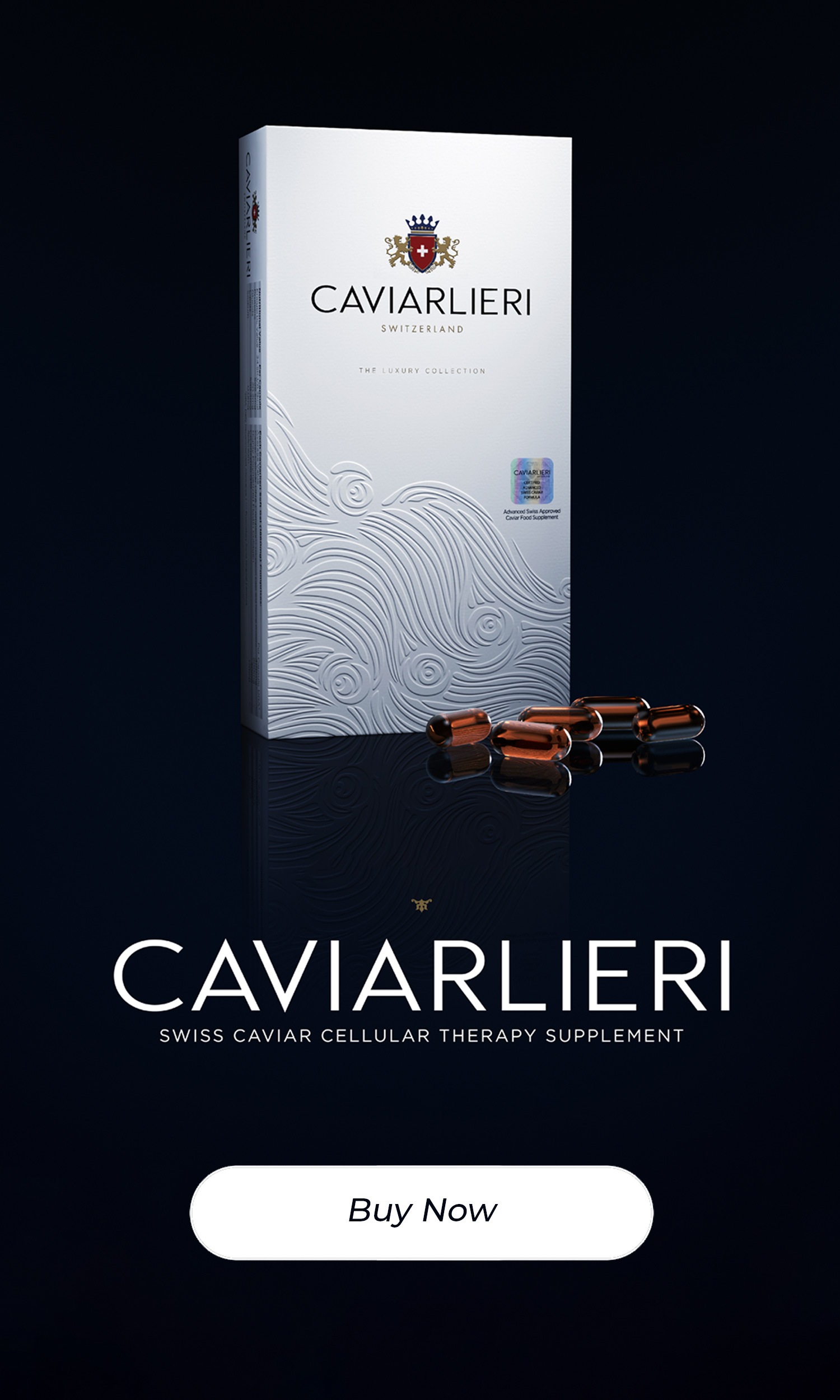Why Controlling your Blood Pressure is Important to Help you to Reduce your Risks of Cardiovascular Diseases?
Caviarlieri | Published November 17, 2020
High blood pressure or hypertension, is severely injurious to your health because it exerts undue pressure on the heart to work harder than normal in order to pump blood to the heart and into the other organs of our body. After a period of time, this exertion on the heart will cause the hardening of your arteries, a condition known as atherosclerosis which will increase your risk to serious health problems. Uncontrolled high blood pressure increases your risk to heart attack and stroke.
Understanding High Blood Pressure
Your blood pressure is determined both by the amount of blood your heart pumps and the amount of resistance to the blood flow in your arteries. The more blood your heart pumps and if your arteries are narrower than normal, the higher will be your blood pressure.
Surprisingly nearly half of the adults in the United States (108 million, or 45% of the population) have hypertension. Hypertension is defined as a condition when your systolic blood pressure is above 130 mmHg or your diastolic blood pressure is below 80 mmHg. It is estimated that only about 1 in 4 adults (24%) with hypertension have their condition under control.
The unique peculiarity of having high blood pressure (hypertension) is that you can have the condition for years without you experiencing any symptoms. That is why it is termed as the “silent killer”. You may be unaware of it unless you are alerted by your doctor or if you experience headaches, shortness of breath or nosebleeds. However, these signs and symptoms are not specific and usually do not occur until your high blood pressure has reached a severe or life-threatening stage. The problem is that even without the symptoms the damage to your blood vessels and your heart continues and your health will slowly deteriorate.
Complications of High Blood Pressure
Uncontrolled high blood pressure can lead to several complications including:
- Heart attack or stroke. High blood pressure can cause the hardening and thickening of your arteries (atherosclerosis), which can lead to a heart attack, stroke or other complications.
- Aneurysm. Increased blood pressure can cause your blood vessels to weaken and bulge, forming an aneurysm which is an excessive enlargement of your blood vessels.. If an aneurysm ruptures, it can be life-threatening as it will lead to uncontrolled bleeding.
- Heart failure. To pump blood against the higher pressure in your vessels, the heart has to work harder. This causes the walls of the heart’s pumping chamber to thicken (left ventricular hypertrophy). Eventually, the thickened muscle may have a hard time pumping enough blood to meet your body’s needs, which can lead to heart failure.
- Weakened and narrowed blood vessels in your kidneys. This can prevent these organs from functioning normally.
- Thickened, narrowed or torn blood vessels in the eyes. This can result in vision loss.
- Metabolic syndrome. This syndrome is a cluster of disorders of your body’s metabolism, including increased waist circumference; high triglycerides; low high-density lipoprotein (HDL) cholesterol, the “good” cholesterol; high blood pressure and high insulin levels. These conditions will make you more likely to develop diabetes, heart disease and stroke.
- Trouble with memory or understanding. Uncontrolled high blood pressure may also affect your ability to think, remember and learn. Trouble with memory loss or understanding concepts is more common in people with high blood pressure.
- Dementia. Narrowed or blocked arteries can limit the blood flow to the brain, leading to a certain type of dementia (vascular dementia). A stroke that interrupts the blood flow to the brain can also cause vascular dementia.
There are two types of high blood pressure.
Primary (essential) Hypertension
For most adults, there’s no single identifiable cause of high blood pressure. This type of high blood pressure, called primary (essential) hypertension, tends to develop gradually over many years. Researchers are still unclear what mechanisms in the body cause blood pressure to slowly increase. It is believed that a combination of factors may play a role. These factors include:
Genes: Some people are genetically predisposed to hypertension. This may be from gene mutations or genetic abnormalities inherited from your parents.
Physical changes: If something in your body changes, you may begin experiencing the consequences throughout your body. High blood pressure may be one of those consequence. For example, it is widely believed that changes in your kidney function due to aging may upset the body’s natural balance of salts and fluid. This change may cause your body’s blood pressure to increase.
Environment: Over time, unhealthy lifestyle choices like lack of physical activity and poor diet can take their toll on your body. Lifestyle choices can lead to weight problems. Being overweight or obese can increase your risk for hypertension.
Secondary Hypertension
Some people have high blood pressure caused by an underlying condition. This type of high blood pressure, called secondary hypertension, tends to appear suddenly and cause higher blood pressure as compared to primary hypertension. Various conditions and medications can lead to secondary hypertension, including:
- Obstructive sleep apnea
- Kidney problems
- Adrenal gland tumours
- Thyroid problems
- Certain defects you’re born with (congenital) in blood vessels
- Certain medications, such as birth control pills, cold remedies, decongestants, over-the-counter pain relievers and some prescription drugs
- Illegal drugs, such as cocaine and amphetamines
Risk factors of High Blood Pressure

- Age. The risk of high blood pressure increases as you age. Till the age of about 64, high blood pressure is more common in men. Women are more likely to develop high blood pressure after the age of 65.
- Race. High blood pressure is particularly common among people of African heritage, often developing at an earlier age than it does in whites. Serious complications, such as stroke, heart attack and kidney failure, also are more common in people of African heritage.
- Family history. High blood pressure tends to run in families.
- Being overweight or obese. The more you weigh the more blood you need to supply oxygen and nutrients to your tissues. As the volume of blood circulated through your blood vessels increases, so does the pressure on your artery walls.
- Not being physically active. People who are inactive tend to have higher heart rates. The higher your heart rate, the harder your heart must work with each contraction and the stronger the force on your arteries. Lack of physical activity also increases the risk of being overweight.
- Using tobacco. Not only does smoking or chewing tobacco immediately raise your blood pressure temporarily, but the chemicals in tobacco can damage the lining of your artery walls. This can cause your arteries to narrow and increase your risk of heart disease. Second-hand smoke also can increase your heart disease risk.
- Too much salt (sodium) in your diet. Too much sodium in your diet can cause your body to retain fluid, which increases blood pressure.
- Too little potassium in your diet. Potassium helps balance the amount of sodium in your cells. If you don’t get enough potassium in your diet or retain enough potassium, you may accumulate too much sodium in your blood.
- Drinking too much alcohol. Over time, heavy drinking can damage your heart. Having more than one drink of alcohol a day for women and more than two drinks a day for men may affect your blood pressure.
If you drink alcohol, do so in moderation. For healthy adults, that will mean up to one drink a day for women and two drinks a day for men. One drink equals to 12 ounces of beer, 5 ounces of wine or 1.5 ounces of 80-proof liquor.
- Stress. High levels of stress can lead to a temporary increase in blood pressure. If you try to relax by eating more by using tobacco or drinking alcohol, you may only increase problems with high blood pressure.
- Certain chronic conditions. Certain chronic conditions also may increase your risk of high blood pressure, such as kidney disease, diabetes and sleep apnea.
- Aneurysm. Increased blood pressure can cause your blood vessels to weaken and bulge, forming an aneurysm. If an aneurysm ruptures, it can be life-threatening.
- Heart failure. To pump blood against the higher pressure in your vessels, the heart has to work harder. This causes the walls of the heart’s pumping chamber to thicken (left ventricular hypertrophy). Eventually, the thickened muscle may have a hard time pumping enough blood to meet your body’s needs, which can lead to heart failure.
Thickness of your Carotid Artery Wall Reflect Risks of Heart Attack and Stroke
According to a report by the New England Journal of Medicine, the thickness of the carotid artery wall, as measured by using ultrasound, is a good predictor of heart attack and stroke in asymptomatic, elderly individuals.
Researchers from the multicentre Cardiovascular Health Study Collaborative Research Group in the United States undertook a clinical observational study. They enrolled 5858 subjects, 4476 of whom had no previous history of cardiovascular disease for the study. Sixty per cent of the subjects were women, 15% black, and the remainder were white. Their average age was 72 years.
The investigators measured the intimal and medial wall thickness of the common carotid and internal carotid arteries in the study subjects and then followed them for an average of 6.2 years, recording the rate of myocardial infarcts and strokes over the years.
Although researchers monitored and recorded the health, lifestyle, and diet of the subjects, the diagnosis and treatment of heart disease were left to the patient’s own doctors. The researchers divided the study participants into five groups, according to the thickness of their carotid arteries.
The investigators found a direct relation between carotid arterial wall thickness and cardiovascular event risk. A nearly fivefold increase in stroke or heart attack rates occurred in people with the thickest carotid arteries compared with those with the thinnest. Participants with the thinnest carotid artery walls had 40 cardiovascular events compared with 184 in those with the thickest walls.
The relative risk of stroke or heart attack for the fifth with the greatest wall thickness compared with the lowest fifth was 3.87. Moreover, this indication proved stable even when traditional cardiovascular risk factors of age, sex, blood pressure, cholesterol levels, smoking, and diabetes were controlled for.
Although it is reasonable to assume that arterial wall thickness would reflect risk of cardiovascular morbidity, this is the first clinical well reputed study to confirm such an assumption. Arterial walls also thicken both as a result of deposition of cholesterol and atherosclerotic plaque and in response to stress on the walls of the arteries as in hypertension.
Controlling Your Blood Pressure with Caviarlieri
Why Caviarlieri
Caviarlieri is scientifically proven to help reduce the inflammatory infiltration of the intima, which is the innermost part of a blood vessel. Arteries are the blood vessels that deliver oxygen-rich blood from the heart to the tissues of the body. High blood pressure patients usually have “thickened intima” or hardening of the blood vessels. A study on Caviarlieri published in the reputed Europe PMC journal entitled “Protective Effect of a Fish Egg Homogenate Marine Compound on Arterial Ultrastructure in Spontaneous Hypertensive Rats” shows that the “thickened intima/ blood vessels” in spontaneous hypertensive rats were significantly reduced when treated with Caviar DNA Extracts- LD 1227. This will potentially reduce the risks of cardiovascular diseases.
This same study also demonstrated a significant reduction in endothelial damage and dysfunction in spontaneous hypertensive rats when treated with Caviar DNA Extracts- LD 1227. In endothelial dysfunction, the vasodilation is impaired, and the arteries begin to lack the ability to dilate properly. This dysfunction can be a significant predictor of coronary artery disease and atherosclerosis, a chronic disease condition which can cause a stroke or a heart attack.
Therefore, the results of the study suggests that Caviarlieri has “arterial protective properties” and may potentially help prevent the onset and delay the progression of cardiovascular diseases.
Protective Effect of a Fish Egg Homogenate Marine Compound on Arterial Ultrastructure in Spontaneous Hypertensive Rats
- Published in Peer Reviewed Journal – Rejuvenation Research Volume 17 Number 2, April 2014
Nicola Zerbinati,1 Francesco Marotta,2 Ravinder Nagpal,3,4 Birbal Singh,5 Dheeraj Mohania,6 Michele Milazzo,7 Angelo Italia,7 Claudio Tomella,2 and Roberto Catanzaro7
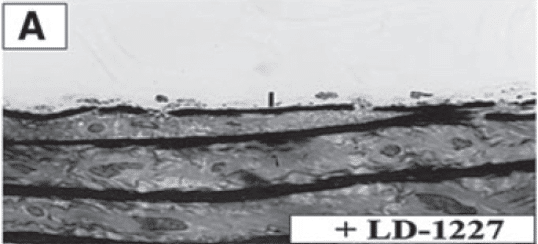
It has been reported that lipid peroxidation may be partly responsible for the detrimental effects of changes in arterial structure caused by hypertension. This study assessed the effect of a sturgeon eggs–based nutraceutical Caviar Cellular DNA Extract (LD-1227 – Caviarlieri) as compared to EPA/DHA on the ultrastructure of spontaneously hypertensive rat (SHR) aortas. The aorta is the main and largest artery in the human body. Sixty SHR were randomly divided into three groups that were fed (1) rat chow, (2) rat chow plus 10 mg of EPA/DHA, or (3) rat chow plus 10 mg of LD-1227, for 18 weeks. Afterward, the aortas of these rats were used for blind measurements of the thickened intima area and examination by electron microscopy. Control SHR showed an expanded subendothelial space and leukocyte infiltration of the intima that were reduced in LD-1227–fed rats ( p < 0.05) and less in EPA/DHA group. Transmission electron microscopy showed endothelial alteration with severe subcellular injury and, unlike the EPA/DHA-group, LD-1227–treated rats displayed a significant reduction in endothelial alteration with severe subcellular injury ( p < 0.05). These data suggest that LD-1227 has stronger arterial protective properties and further investigation for use of it for a preventive medicine strategy is to be conducted.
FIG. 1. Light microscopy and electron microscopy analysis of arterial structure in spontaneously hypertensive rats (SHR): Effect of LD-1227 (Thickened Intima)
It is evident the “thickened intima/ blood vessels” were significantly reduced in rats that were treated with Caviar DNA Extracts- LD 1227.Measurements: (4110 µm² vs.
5530 µm² , p = 0.05) for rats treated with 10 mg of DHA. Caviar DNA Extract is more effective in reducing hypertension than DHA.
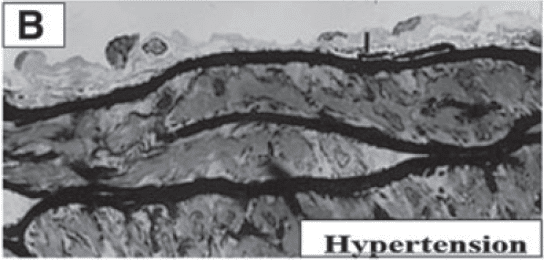
Thickened Intima of rats that are not treated with DHA or Caviar DNA Extracts.
Measurement : 7147 µm²
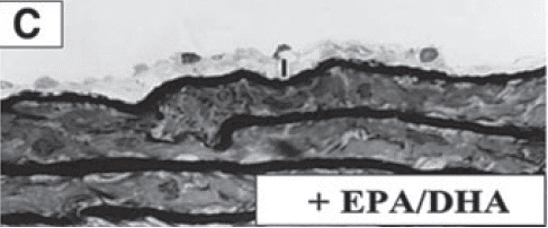
Thickened Intima of rats that are treated with DHA showed reduction with DHA even though it is not as effective Caviar DNA Extract. Measurement :5530 µm² vs 7147 µm² non treated rats p = 0.05)
FIG. 2. Transmission electron microscopy analysis of arterial structure in spontaneously hypertensive rats (SHR): Effect of LD-1227
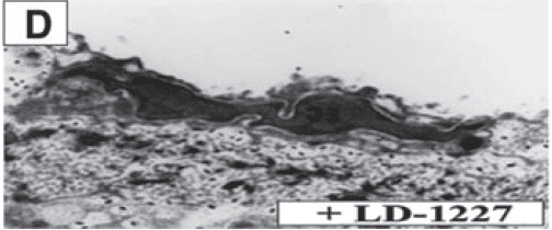
It is evident that the rats treated with Caviar DNA Extracts- LD 1227 displayed a significant reduction in the structural alteration of endothelial cells with severe subcellular injury (atypical mitochondria of smooth muscle cells, such as swollen and vacuolated mitochondria, and several vacuoles and electron-lucent chromatin).
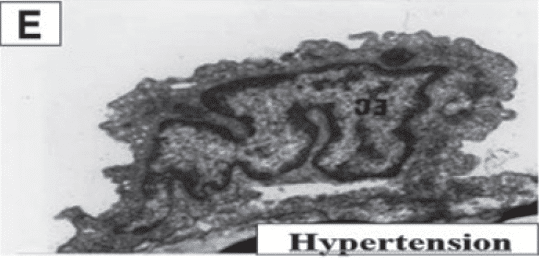
SHR showed an increase in the density and frequency of occurrences of cytoplasmic vacuoles and cytoplasmic processes of endothelial cells, with longer and more slender cytoplasmic processes.
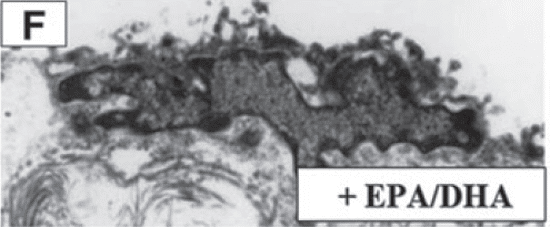
Unlike the Caviar DNA Extract treated rats, in the EPA/DHA-group of rats , there is no apparent reduction of structural alteration of endothelial cells with severe subcellular injury when treated with DHA
Therefore, DHA is less effective than Caviar DNA Extract.
Conclusive Summary
Hypertension represents a main risk factor of cardiovascular diseases which is linked with endothelial dysfunction. Structural abnormalities of endothelium in vessels observed in hypertensive animals indicate their likely contribution to the development or maintenance of high blood pressure. Hypertension is associated with structural changes in blood vessels known as ‘‘vascular remodelling’’ that include dynamic structural changes involving cell growth, migration, phenotypic changes, and extracellular matrix synthesis and degradation. The effects of LD-1227 on the expression of angiotensin-converting enzyme 2, mitogen-activated protein kinase (MAPK) signalling, and peroxisome proliferator activated receptor-c in aortas of SHR are evident, and preliminary in-house data show a significant beneficial modulation exerted by this marine nutraceutical.
In conclusion, these preliminary data from the clinical studies suggest that Caviar DNA Extract, LD-1227 has strong arterial protective properties and they are stronger than EPA/DHA .Further clinical studies are currently being undertaken to evaluate the use of Caviarlieri for a preventive cardiovascular protective medical strategy against hypertension.
Subject
Recent Posts
-
The Amazing Benefits of Highly Polymerized Fish Collagen Peptides with Elastin – Caviarlieri
-
The World’s Most Effective Caviar DNA Extract with Marine Bioactive Peptides
-
Are Supplements effective for Joint Pain?
-
Why Is Sustainable Immunity Important for Your Long-Term Health
-
What is your “Body Age” – Biological Age?

